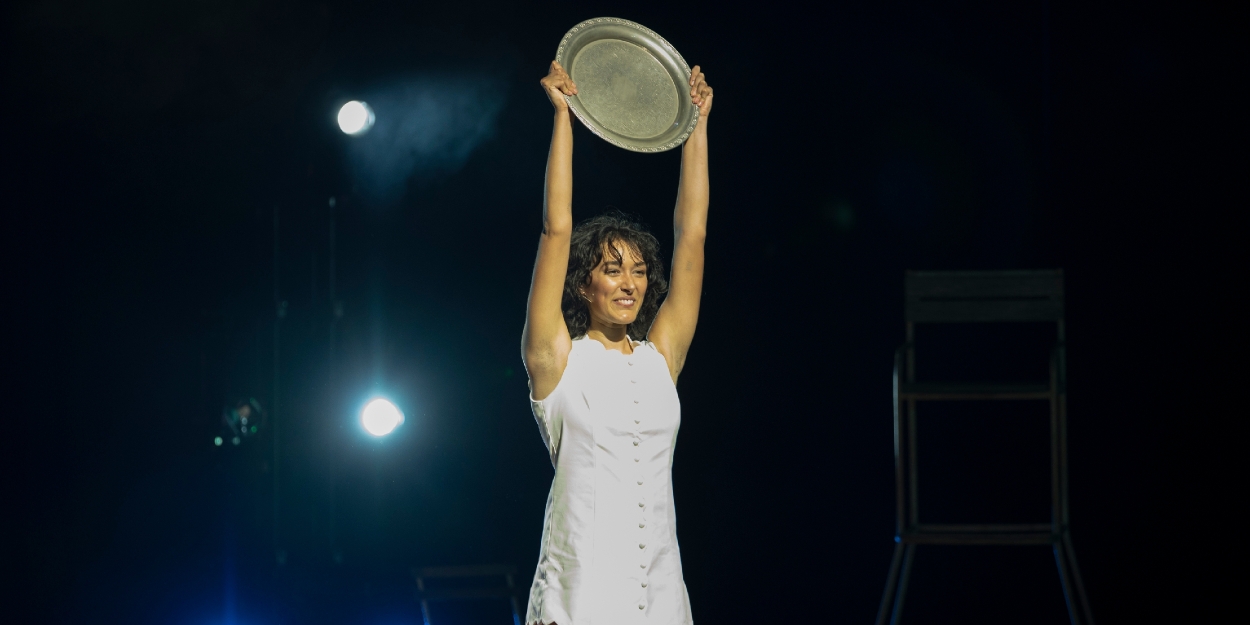Review: SUNSHINE SUPER GIRL at Dunstan Playhouse, Adelaide Festival Centre
Australia's tennis trailblazer, Evonne Goolagong Cawley.

Reviewed by Barry Lenny, Tuesday 6th September 2022.
Anybody with even a passing interest in tennis would have heard of Ash Barty. Long before her, though, another indigenous Australian, Wiradjuri, Evonne Goolagong, was the star of Wimbledon, and Sunshine Super Girl, the current production from The State Theatre Company of South Australia, is her story. The production was written and directed by Yorta Yorta/Gunaikurnai playwright, Andrea James. James drew on interviews she had with Evonne, who was closely involved in the development of the work. The play covers major points and significant events in Goolagong's life and career, in this fast-paced one-act play.
Born 31st July 1951, Evonne Fay Goolagong Cawley AC MBE, grew up in a tin shed in Barrellan, in New South Wales, that had a dirt floor and no electricity. She later moved to an old shop, with her parents and, eventually, seven siblings. She was obsessed with tennis, but poverty meant that the nearest that she could get to playing was, along with her brother and sister, to hit a tatty old ball against a wall with a piece of wood from an old fruit crate, roughly shaped into a racquet. Bill Kurtzman, president of the Barellan War Memorial Tennis Club, invited her to come and learn. He immediately recognised her potential.
Vic Edwards, a coach from Sydney, heard about her and travelled the 400 miles to see her play. He took the fourteen-year-old to Sydney and enrolled her at Willoughby Girls School. The whole town was involved in raising the necessary money for her air fair and tuition. While only 15, she won the New South Wales Championship, and then entered the Australian Nationals in 1967. She retired in 1983, suffering from injuries that she had received, having won a vast number of championships, worldwide, far too many to list here.
The play opens, after the cast members appear in tennis whites and begin to warm up, with the young girl fishing in her mother's favourite spot on the Murrumbidgee River, and her introduction slides neatly from talking about fishing to her early love of tennis.
There are highlights, and darker moments, such as the death of her father while she is on tour in America, where married Vic Edwards, whose clumsy sexual advances she has rejected, talks her into continuing to play, missing the funeral. She eventually sacks him. Racial discrimination rears it ugly head, as a child, having to sit right at the front at the cinema, on tour, when an opponent uses the 'N' word, and when made an "honorary white" to be able to play in South Africa. Balancing this is the joys of her marriage and motherhood, and a stream of trophies and accolades. There is so much more to tell of her life and work after leaving the tennis circuit, but that is another wonderful story.
An important underlying aspect of this production is, of course, her connection to her roots, her family, her culture, and to country.
Ella Ferris does a sterling job in the role of Evonne Goolagong, going from the enthusiastic, excited little girl, to a teenager rising through the ranks, to a major, successful career, to a wife, mother, and star of international tennis. Her performance is, as you would no doubt expect, extremely energetic, and immensely physical, but it doesn't end there. She gives us a thoughtful and fully developed character, captivating the audience, and reminding us why Australians fell in love with the Sunshine Supergirl.
The other four in the ensemble: Katina Olsen, Jax Compton, Lincoln Elliott, and Kirk Page, portray a wide range of characters with great skill. Lincoln Elliott, among other roles, plays her loving, devoted, and supportive father, Kenny, and her equally loving, devoted, and supportive husband, Roger Cawley, whom she married in 1974, while Jax Compton plays her proud mother. Kirk Page plays her brother, Larry, as well as the despicable Mr. Edwards, and Katina Olsen plays her sister, as well as several of the other players against whom she competed.
It is fascinating to watch these four transforming instantly from one character to another, some major, some reappearing at intervals, some fleeting, but all convincing. There's a lot of talent on stage in this production.
Watch out for the hilarious portrayal of Roger Newcombe; it is not to be missed. The flamboyant Ted Tinling, who designed controversial tennis outfits, also makes a brief comical appearance.
Romanie Harper's set is simple and sparse, with tiered seats at the back of the stage, occupied by a few lucky members of the audience, a mobile tennis net, an umpires seat, a couple of benches, and a few crates that represent her home. Harper's costumes, too, are important, well beyond being simply generic outfits.
There is a superb display of tightly choreographed movement and dance from Vicki Van Hout and Katina Olsen, who is also a member of the cast, particularly taking advantage of Ferris's ballet training, and an eclectic mix of music and sound, provided by Gail Priest. Mic Gruchy's video design and Karen Norris's lighting design go hand in hand in, neatly delineating times and places.
The performance ended with thunderous applause, and several well-deserved curtain calls. The State Theatre Company is on a winner with this production, telling the story of another winner. Don't miss it.
Photography, Paz Tassone.
Comments
.png)
|
.png)
|
Videos

